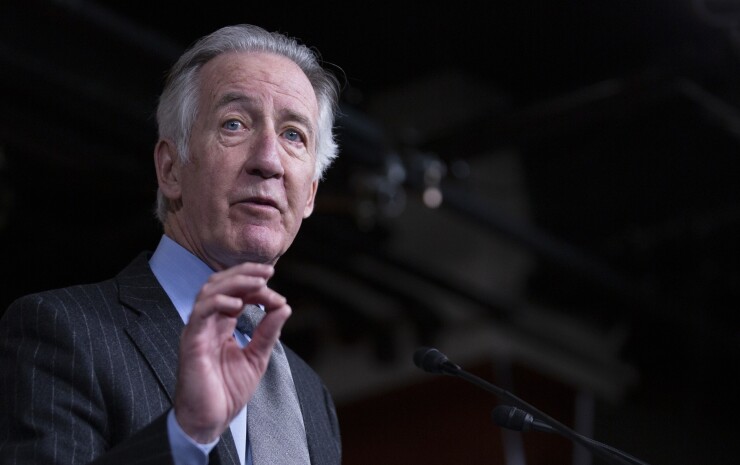
The $2 trillion emergency relief bill that cleared Congress Friday has lawmakers turning their attention to a fourth bill that will focus on continued relief as well as economic stimulus that public finance advocates want to include a reinstatement of advance refunding.
“There will be a phase four that will be real stimulus,” House Ways and Means Committee Chairman Richard Neal, D-Mass., said during Friday’s floor debate
House Financial Services Committee Chairwoman Maxine Waters, D-Calif., described the $2 trillion package approved Friday as “a down payment” on what Congress will eventually pass.
Speaker Nancy Pelosi, D-Calif., also said the next package will make up for shortcomings that haven’t been addressed such as the insufficient aid to state and local governments.
“Next we will do recovery and hopefully that will be soon, always addressing the emergency and the mitigation needed,” Pelosi said in her closing remarks just prior to the vote.
After listening to lawmakers from both parties, Pelosi said, “We know that this cannot be our final bill,” echoing Waters' "down payment" sentiment.
“For our fight against the coronavirus, our state and local governments will need vastly more support for preventing, preparing for and responding to the crisis,” Pelosi said. “Our hospitals and health systems still need vast infusions of funding.”
National League of Cities Executive Director and CEO Clarence Anthony has sent a letter to congressional leaders urging them to use the next bill to increase funding for the Coronavirus Relief Fund to $250 billion from the current $150 billion. He also has requested lowering the popultion threshold for municipalities to receive direct aid from the Treasury to 50,000 from the current 500,000.
The NLC letter also asks Congress to provide governmental employers the access to tax credits for the paid sick and paid emergency leave that they are required to provide to employees.
“I think what’s most important is that Congress passes the bill that’s before them today so they can focus on the next stimulus bill so we can get that relief out ASAP,” Irma Esparza Diggs, director of federal advocacy for the National League of Cities, said a couple of hours prior to the House vote. “Just keep it moving so we can move on to the next. There’s a lot of good things in there for cities so we just need to get that money out the door.”
In addition to the Coronavirus Relief Fund, the bill has $130 billion for health care systems that includes a $127 billion for a Public Health and Social Services Emergency Fund; education emergency assistance totaling $30.9 billion; $25 billion for transit systems; $10 billion for airports and $5 billion for Community Development Block Grants.
In the next round of legislation, the Government Finance Officers Association is working with other groups in the Public Finance Network to lobby for reinstatement of advance refunding and an increase in the cap on bank qualified debt to $30 million from the current $10 million limit.
Emily Brock, director of the federal liaison center for GFOA, said the PFN will be asking the Federal Reserve to hasten its purchase of municipal bonds on the secondary market.
The Federal Reserve’s recent hiring of muni veteran
Hiteshew worked at Treasury from 2014 through May 2017 as director of the Office of State and Local Finance.
“He exclusively did Puerto Rico,” Brock said. “He has a very firm recent regulatory appreciation of issuers in distress but he also understands we are different from Puerto Rico and that this situation is fundamentally different. I’ve spoken with him three times in the past three days. He is very much in outreach mode and so it does make me feel good that he has been put on staff.”
The Federal Reserve will need to help states and local governments with their cash flow problems in the coming months, stabilizing the market as some will need to issue tax anticipation notes as a result of the three month postponement of the tax filing deadline.
Brock said GFOA wants the Fed to ensure there is a fair and efficient marketplace with normal pricing for primary offerings.
Moody’s issued a report Friday regarding the three month extension for filing federal income taxes and how it will impact state revenues. “The extension means many states will receive a large portion of their income tax collection in July instead of April, forcing them to make adjustments to bridge unexpected budget gaps,” Moody’s said.
“States have extensive flexibility to deal with a shift in the timing of tax filings and soften the budgetary impact of a delay in income tax collections,” Matt Butler, vice president at Moody’s, said in a press statement. “The shift will compel some states to slow spending and dip into reserves to bridge the shortfall in receipts. Others may engage in short-term borrowing in order to maintain available reserves and liquidity. Healthy reserves accumulated over the past several years of economic growth will help ease the difficulties arising from revenue delays."





